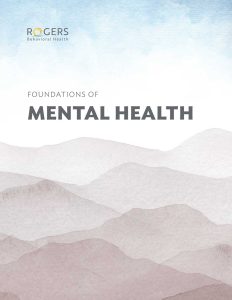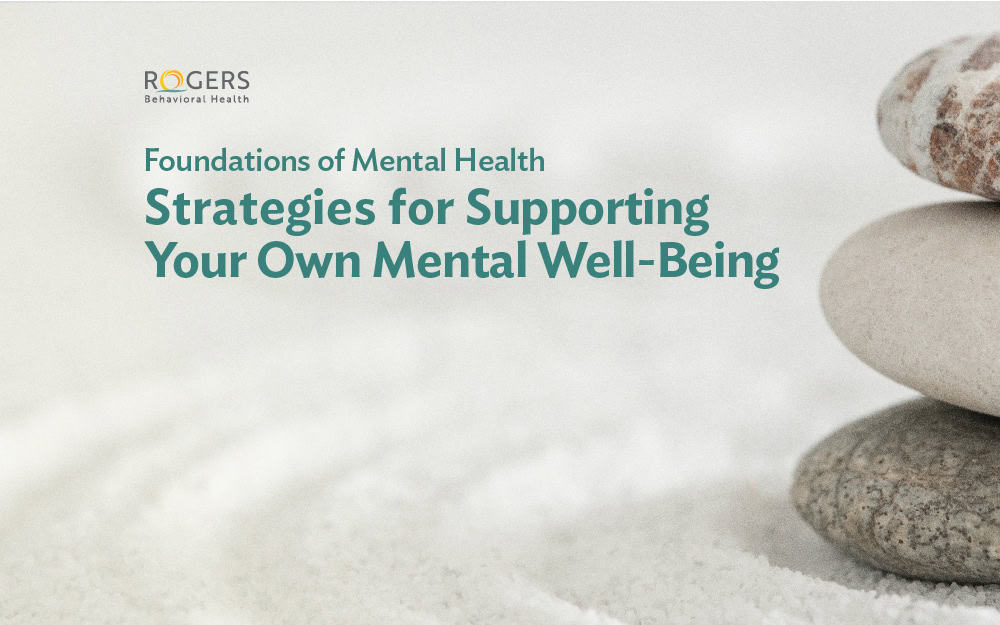Work demands. Strained relationships. Family challenges. It can be difficult to maintain your mental well-being amid the pressures and problems we all face.
In the final part of our series, Foundations of Mental Health: A Beginner’s Guide, we focus on strategies for supporting your mental health. We share tips so that you can:
- Take care of your mental health as a daily practice
- Enhance your mental resilience
Rogers Behavioral Health’s Dr. Heather Jones, PhD, vice president of clinical services, shares practical ways for you to nurture your mental health and live a more balanced, fulfilling life.
Dr. Jones, how can we nurture our mental health in daily life?
Since our mental health affects how we think, feel, and act, impacting how we relate to others and make decisions, it’s important that we take care of our mental well-being daily. Small things can have a big impact.
Some suggestions are:
- Practice mindfulness or meditation.
- Spend time in nature.
- Put aside technology.
- Try a breathing app.
- Find a hobby you enjoy.
- Spend time with people who bring you joy.
Rogers’ experts regularly discuss common mental health conditions as well as general mental health topics and mental health treatment options in our blogs. Here is a list of some popular topics that may be of interest:
- 3 ways mindfulness boosts mental health
- 6 ways to practice gratitude
- 10 benefits of self-compassion
- 10 ways to help kids manage uncomfortable emotions
- Catastrophic thinking: 3 ways to challenge negative thoughts
- How to combat loneliness
- How better nutrition can boost your mental health
- Resilience
- How rumination harms your mental health
- How to practice self-care
Dr. Jones, how can a person improve their mental resilience?
One thing we practice with people in our care to help build mental resilience is called radical acceptance.  Simply stated, it means accepting the way things are even when they’re not how you want them to be. It doesn’t mean that you have to like what is happening, but you stop fighting against the reality of what is.
Simply stated, it means accepting the way things are even when they’re not how you want them to be. It doesn’t mean that you have to like what is happening, but you stop fighting against the reality of what is.
Working with a professional can help you identify the difficult emotions that you’re feeling and create a safe space to feel them. Radical acceptance involves putting a pause between your emotion and your reaction to that emotion. Imagine that I really want to go to a concert. I’ve been waiting a long time for it, and I’m super excited. I bought my tickets early then, unexpectedly, it gets cancelled. I am super bummed. I might stew on how unfair the situation is and feel angry, which might cause me to yell at my spouse because I’m just so frustrated and disappointed. In that situation, radical acceptance would look like feeling all of those feelings, expressing how I feel, and sitting with the fact that the concert I was so excited for just got cancelled. It stinks and I’m capable of giving myself permission to feel really frustrated, angry, disappointed, and sad, and that’s okay. I recognize the concert getting cancelled is out of my control and there’s nothing I can do about it. That would be an example of building the skill of radical acceptance.
It can be difficult for people to radically accept something really big that’s happened in their lives if they’re not used to managing difficult emotions. A person might use substances or other things in order to mask those feelings.
At Rogers, we understand, which is why we work with people to develop a safe place to:
- Acknowledge and tolerate difficult emotions
- Accurately identify and name these emotions
- Build resilience effectively to handle challenging emotions
It is freeing for people to learn how to feel intensely sad, disappointed, or frustrated and experience success in moving past those intense feelings skillfully, which improves their overall mental resilience and well-being.
Dr. Jones, how do we benefit from tending to our mental health?
We know that there’s a strong link between emotional and physical well-being. Having better mental health helps us have greater resilience in the face of adversity or stress, and we experience better physical health. There’s a lot that life throws at us, and there are a lot of unknowns and uncertainties. Tending to our mental well-being helps us be better prepared.
Rogers provides mental health therapy
If you or a loved one is struggling with mental health or addiction, call for a free, confidential screening at 833-308-5887to understand how our mental health services may help you.
Thank you for taking the time to read this blog series. We sincerely hope you feel better equipped to manage your own mental health and support others who are struggling. Rogers is here to partner with you in your mental health journey and provide you with the tools you need.



